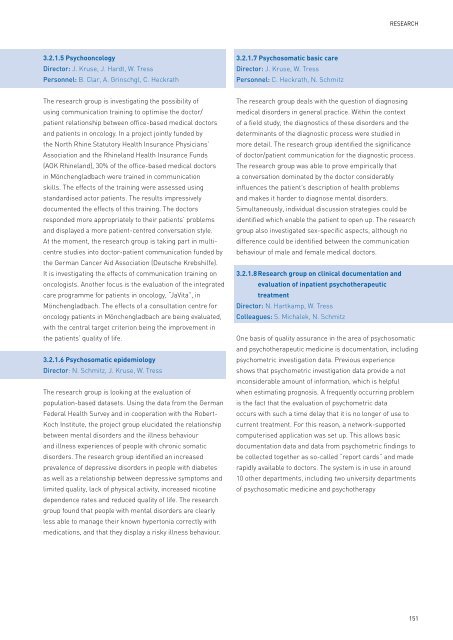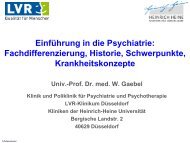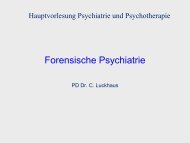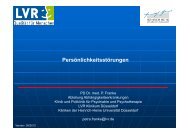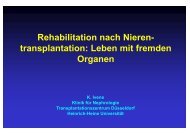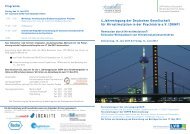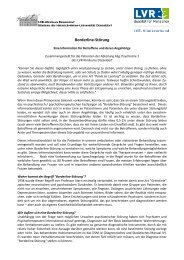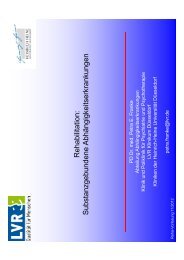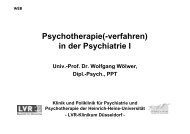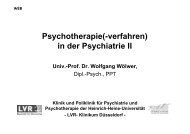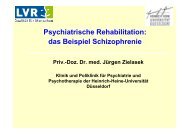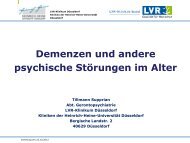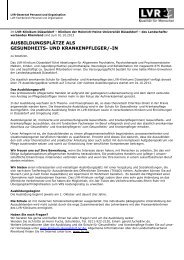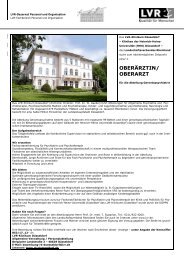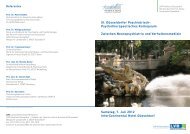LVR-Klinikum Düsseldorf Hospital of the Heinrich-Heine University ...
LVR-Klinikum Düsseldorf Hospital of the Heinrich-Heine University ...
LVR-Klinikum Düsseldorf Hospital of the Heinrich-Heine University ...
Create successful ePaper yourself
Turn your PDF publications into a flip-book with our unique Google optimized e-Paper software.
3.2.1.5 Psychooncology<br />
Director: J. Kruse, J. Hardt, W. Tress<br />
Personnel: B. Clar, A. Grinschgl, C. Heckrath<br />
The research group is investigating <strong>the</strong> possibility <strong>of</strong><br />
using communication training to optimise <strong>the</strong> doctor/<br />
patient relationship between <strong>of</strong>fice-based medical doctors<br />
and patients in oncology. In a project jointly funded by<br />
<strong>the</strong> North Rhine Statutory Health Insurance Physicians’<br />
Association and <strong>the</strong> Rhineland Health Insurance Funds<br />
(AOK Rhineland), 30% <strong>of</strong> <strong>the</strong> <strong>of</strong>fice-based medical doctors<br />
in Mönchengladbach were trained in communication<br />
skills. The effects <strong>of</strong> <strong>the</strong> training were assessed using<br />
standardised actor patients. The results impressively<br />
documented <strong>the</strong> effects <strong>of</strong> this training. The doctors<br />
responded more appropriately to <strong>the</strong>ir patients’ problems<br />
and displayed a more patient-centred conversation style.<br />
At <strong>the</strong> moment, <strong>the</strong> research group is taking part in multicentre<br />
studies into doctor-patient communication funded by<br />
<strong>the</strong> German Cancer Aid Association (Deutsche Krebshilfe).<br />
It is investigating <strong>the</strong> effects <strong>of</strong> communication training on<br />
oncologists. Ano<strong>the</strong>r focus is <strong>the</strong> evaluation <strong>of</strong> <strong>the</strong> integrated<br />
care programme for patients in oncology, “JaVita”, in<br />
Mönchengladbach. The effects <strong>of</strong> a consultation centre for<br />
oncology patients in Mönchengladbach are being evaluated,<br />
with <strong>the</strong> central target criterion being <strong>the</strong> improvement in<br />
<strong>the</strong> patients’ quality <strong>of</strong> life.<br />
3.2.1.6 Psychosomatic epidemiology<br />
Director: N. Schmitz, J. Kruse, W. Tress<br />
The research group is looking at <strong>the</strong> evaluation <strong>of</strong><br />
population-based datasets. Using <strong>the</strong> data from <strong>the</strong> German<br />
Federal Health Survey and in cooperation with <strong>the</strong> Robert-<br />
Koch Institute, <strong>the</strong> project group elucidated <strong>the</strong> relationship<br />
between mental disorders and <strong>the</strong> illness behaviour<br />
and illness experiences <strong>of</strong> people with chronic somatic<br />
disorders. The research group identified an increased<br />
prevalence <strong>of</strong> depressive disorders in people with diabetes<br />
as well as a relationship between depressive symptoms and<br />
limited quality, lack <strong>of</strong> physical activity, increased nicotine<br />
dependence rates and reduced quality <strong>of</strong> life. The research<br />
group found that people with mental disorders are clearly<br />
less able to manage <strong>the</strong>ir known hypertonia correctly with<br />
medications, and that <strong>the</strong>y display a risky illness behaviour.<br />
3.2.1.7 Psychosomatic basic care<br />
Director: J. Kruse, W. Tress<br />
Personnel: C. Heckrath, N. Schmitz<br />
ReseaRch<br />
The research group deals with <strong>the</strong> question <strong>of</strong> diagnosing<br />
medical disorders in general practice. Within <strong>the</strong> context<br />
<strong>of</strong> a field study, <strong>the</strong> diagnostics <strong>of</strong> <strong>the</strong>se disorders and <strong>the</strong><br />
determinants <strong>of</strong> <strong>the</strong> diagnostic process were studied in<br />
more detail. The research group identified <strong>the</strong> significance<br />
<strong>of</strong> doctor/patient communication for <strong>the</strong> diagnostic process.<br />
The research group was able to prove empirically that<br />
a conversation dominated by <strong>the</strong> doctor considerably<br />
influences <strong>the</strong> patient’s description <strong>of</strong> health problems<br />
and makes it harder to diagnose mental disorders.<br />
Simultaneously, individual discussion strategies could be<br />
identified which enable <strong>the</strong> patient to open up. The research<br />
group also investigated sex-specific aspects, although no<br />
difference could be identified between <strong>the</strong> communication<br />
behaviour <strong>of</strong> male and female medical doctors.<br />
3.2.1.8 Research group on clinical documentation and<br />
evaluation <strong>of</strong> inpatient psycho<strong>the</strong>rapeutic<br />
treatment<br />
Director: N. Hartkamp, W. Tress<br />
Colleagues: S. Michalek, N. Schmitz<br />
One basis <strong>of</strong> quality assurance in <strong>the</strong> area <strong>of</strong> psychosomatic<br />
and psycho<strong>the</strong>rapeutic medicine is documentation, including<br />
psychometric investigation data. Previous experience<br />
shows that psychometric investigation data provide a not<br />
inconsiderable amount <strong>of</strong> information, which is helpful<br />
when estimating prognosis. A frequently occurring problem<br />
is <strong>the</strong> fact that <strong>the</strong> evaluation <strong>of</strong> psychometric data<br />
occurs with such a time delay that it is no longer <strong>of</strong> use to<br />
current treatment. For this reason, a network-supported<br />
computerised application was set up. This allows basic<br />
documentation data and data from psychometric findings to<br />
be collected toge<strong>the</strong>r as so-called “report cards” and made<br />
rapidly available to doctors. The system is in use in around<br />
10 o<strong>the</strong>r departments, including two university departments<br />
<strong>of</strong> psychosomatic medicine and psycho<strong>the</strong>rapy<br />
151


